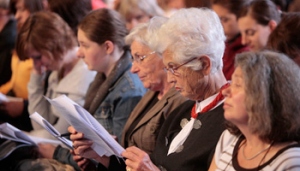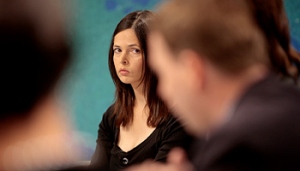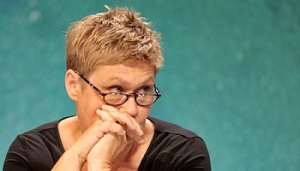 Linda Stift (Bild: ORF/Johannes Puch)
Linda Stift (Bild: ORF/Johannes Puch)
Austrian text failed
Linda Stift’s “Die Welt der schönen Dinge” (The world of beautiful things) opened the second day of the reading competition. Stift was invited to the Bachmann Prize by Karin Fleischanderl – and the juror tried in vain to defend the text against her colleagues – the story failed completely.
“Die Welt der schönen Dinge” tells the story of the journey of a “we-collective” of refugees in a people traffickers’ truck – “dahin wo der Himmel blau ist” (to where the sky is blue) – and the associated hopes for a better life in this mountainous land without a sea – Austria perhaps? When they arrive, the barking of dogs in the distance does not seem to bode well…
 Publikum (Bild: ORF/Johannes Puch)
Publikum (Bild: ORF/Johannes Puch)
Mangold talk about “dishonest means”
“I find this text very annoying”, Ijoma Mangold started off the discussion. Stift’s text, he believes, puts pressure on the reader with its politico-moral structure – the chosen means are “dishonest”. “The ‘we’ of the narrator’s voice changes and stands for the public in general, which at the same time also has creatural and concrete characteristics.” Here, according to Mangold, there can only be an “either – or”. “A great subject, but in this literary-aesthetic form I must reject it: generalisation kitsch.”
Jandl was “disappointed” by the text
Paul Jandl was of a similar opinion: a parable, certainly interesting as an experiment. The end, however, is disappointing, because it does not point to anything. “Therein lies the text’s danger: the ‘we’ also means to combine different realities that are broken. I don’t even know what the subject of the text is: is it the people traffickers, the economic crisis, the refugee situation?” The “great level of abstraction”, he believes, makes it “impossible” to gain access to the subject.
 Linda Stift (Bild: ORF/Johannes Puch)
Linda Stift (Bild: ORF/Johannes Puch)
Feßmann criticised the imprecise use of language
Meike Feßmann also did not like Stift’s text. “The author relies too much on her honourable subject matter.” The we-perspective is extremely difficult, according to the juror, because one has to choose what can be generalised. The problem also lies in the language, which is imprecise: the linguistic-poetic elevation (“blaue Stunde” [blue hour]) does not go with the chosen topic at all. “The author does not have a real conception of refugees, she should know which country the refugees are from.”
Fleischanderl attempts to salvage the text
Now Karin Fleischanderl tried to salvage the text and noted that one should not demand realism from the text, rather, it is about the desires of a collective I, of a “choir” that gives way to a single voice.
Burkhard Spinnen on the idea of the “universal refugee”: “I would like to act as life saver for the text, but the subject matter commits you to an everyday reality”, he believes, “and to a clear decision on a genre. This transplantation experiment does not work.”
 Karin Fleischanderl (Bild: ORF/Johannes Puch)
Karin Fleischanderl (Bild: ORF/Johannes Puch)
Keller: “inadequate literary means”
Hildegard Keller praised the author’s “courageous decision” to tackle this subject matter, but also noted: “Where does this presumption come from, this we?” What’s more, the juror believes, the narrative logic is continuously interrupted by inadequate linguistic means.
Alain Claude Sulzer said: “The text toys with realistic materials.” Linguistically speaking, you get the feeling that “rich Europeans” sit in this lorry. “The people speak the way we do when we are locked in a lorry” – there is also no linguistic difference between men and women.
translated by expectTranslations